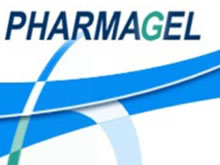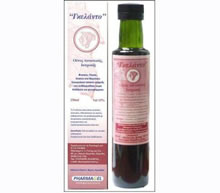
ΠΡΟΙΟΝΤΑ - ICATIBANT
Icatibant Prescribing Information Icatibant 30 mg solution for injection in pre-filled syringe
Presentation: Each pre-filled syringe contains a solution of 3 ml with icatibant acetate equivalent to 30 mg icatibant. Each ml of the solution contains 10 mg of icatibant. Indication: Icatibant is indicated for the symptomatic treatment of acute attacks of hereditary angioedema (HAE) in adults (with C1-esterase-inhibitor deficiency).
Dosage and administration: The recommended dose of icatibant is one subcutaneous injection of 30 mg administered by a healthcare professional, preferably in the abdominal area, for the treatment of an hereditary angioedema attack. No more than 3 injections of Icatibant should be given in a 24 hour period. In clinical trials not more than 8 injections of icatibant per month have been administered. Icatibant is not for self-administration. Icatibant is intended for subcutaneous injection use. For single use only. Injection should be given slowly due to the large volume to be administered (3 ml). Patients with laryngeal attacks need to be carefully managed in an appropriate medical institution after injection until the physician considers discharge to be safe. There is no experience in children. Limited information is available on patients older than 65 years of age. Elderly patients have been shown to have increased systemic exposure to icatibant. The relevance of this to the safety of icatibant is unknown. Contraindications: Hypersensitivity to the active substance or to any of the excipients.
Interactions with other medicinal products and other forms of interaction: ACE inhibitors are contraindicated in HAE patients due to possible enhancement of bradykinin levels.
Warnings and precautions: Ischemic heart disease: Under ischemic conditions a deterioration of cardiac function and a decrease in coronary blood flow could theoretically arise from antagonism of bradykinin receptor type 2. Caution should therefore be observed in the administration of icatibant to patients with acute ischemic heart disease or unstable angina pectoris. Stroke: Although there is evidence to support a beneficial effect of B2 receptor blockade immediately following a stroke, there is a theoretical possibility that icatibant may attenuate the positive late phase neuroprotective effects of bradykinin. Accordingly, caution should be observed in the administration of icatibant to patients in the weeks following a stroke.
Pregnancy and lactation: Icatibant should be used during pregnancy only if the potential benefit justifies the potential risk for the foetus, (e.g. for treatment of potentially life-threatening laryngeal attacks). It is unknown whether icatibant is excreted in human breast milk but it is recommended that breast-feeding women, who wish to take icatibant, should not breast-feed for 12 hours after treatment.
Effects on ability to drive or operate machinery: Patients should be advised not to drive or operate machines if they feel tired or dizzy.
Side effects: Very common (>1110 patients): Almost all subjects who were treated with subcutaneous icatibant in clinical trials developed reactions at the site of injection including erythema, swelling, warm sensation, burning, itching and/or cutaneous pain. These reactions were generally mild in severity, transient, and resolved without further intervention. Common (>1I100, <1I10 patients): nausea, abdominal pain, asthenia, increased blood creatinine phosphokinase, abnormal liver function test, dizziness, headache, nasal congestion, rash. Uncommon (>1/1000, <11100 patients): vomiting, fatigue, pyrexia, pharyngitis, contusion, increased weight, prothrombin time prolonged, hyperuricaemia, proteinuria, asthma, cough, pruritus, erythema, hot flush.
Legal category: POM.
Pharmaceutical precautions: Do not store above 25°C. Do not freeze.
Package quantity and price: Icatibant 30 mg (1 pre-filled syringe) in pack size of 1 syringe. Price: £1395.00.
Marketing authorisation number: EU/1/08/461/001
Further information and full prescribing information is available from the Marketing Authorisation Holder: Jerini AG, InvalidenstraGe 130, 10115 Berlin, Germany. Jerini Medical Information Freephone 00800 7020 7020. Date of preparation: December 2008.
Please refer to the current full Summary of Product Characteristics before prescribing. Adverse events should be reported. Reporting forms and information can be found at http://www.yellowcard.gov.uk Adverse events should also be reported to Jerini AG on 01256 894 000 or on 00800 7020 7020.




